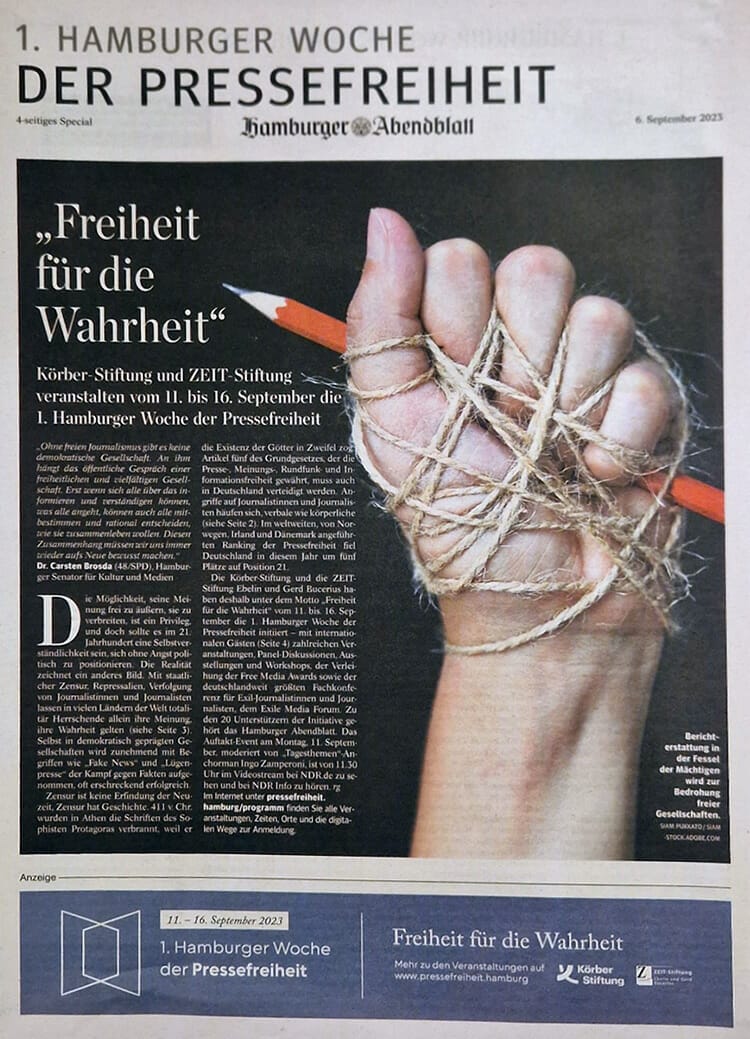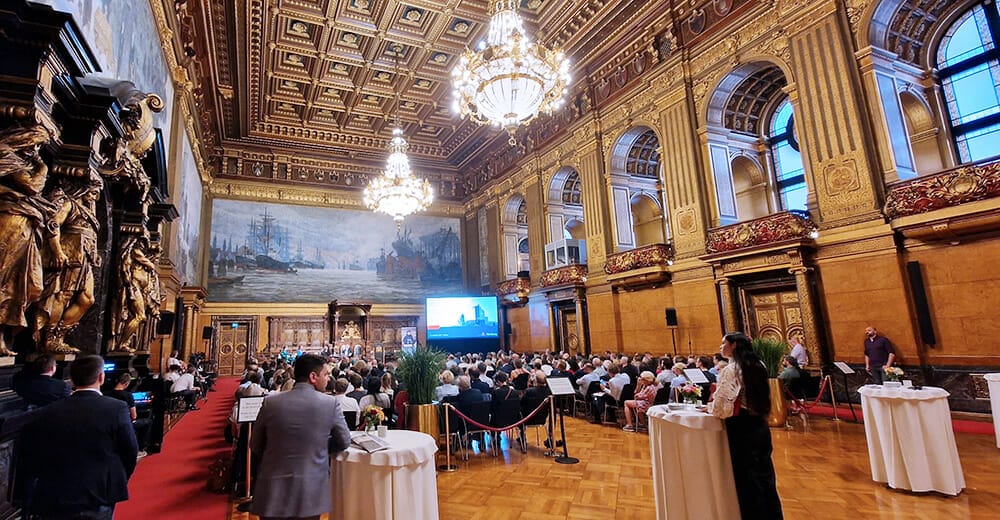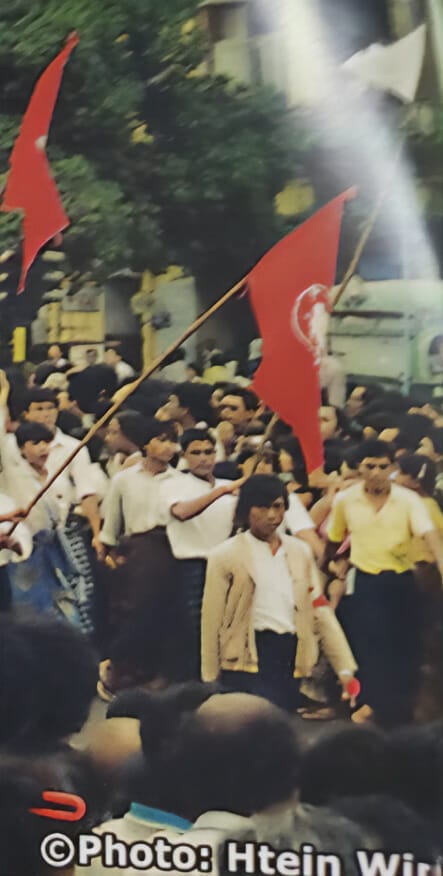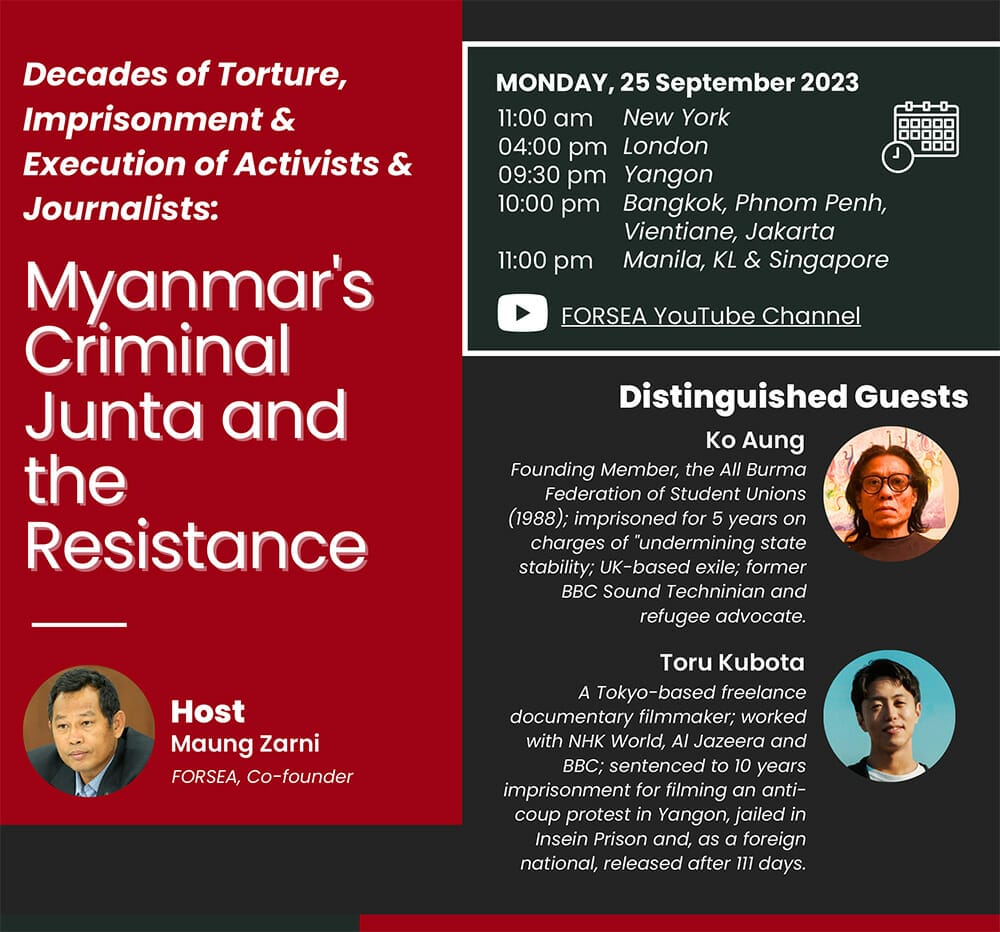The City of Hamburg observes its Press Freedom Week this month.

Recently, at the Exile Media Forum 2023 held in Hamburg, Germany, FORSEA Dialogue Series host and co-founder Maung Zarni presented the findings of his research on the two generations of Myanmar dissidents and their attempts to use value -based journalism (that is, journalism for human emancipation from oppression) as another front of their inter-generational struggle against Myanmar’s 6-decades-old criminal military. (The research was commissioned by the London-based Justice for Journalists Foundation, a co-sponsor and a co-organizer of the Hamburg forum).

The Opening Ceremony and Reception at the Hamburg City Hall, 11 September 2023. Among the distinguished guests were Dmitry Muratov, one of Russia’s best-known journalists whom Moscow had added to its list of “foreign agents” earlier this month, Chinese, Ukrainian, Turkish and Afghanistan exiled journalists.
At the forum, the FORSEA Dialogue host also heard various sordid tales and methods of persecution of journalists, citizen journalists and other rights defenders by the growing number of variously neo-totalitarian regimes throughout the world including Afghanistan, Iran, Belarus, Russia, Turkey, Tajikistan and Ukraine.

Exile Media Forum 2023
In the discussions, Afghanistan emerged as the worst place for journalists with over 200 journalists variously persecuted since the return of the Taliban to power in Kabul. The runner-up will have to be Myanmar. The widely hated coup regime of Min Aung Hlaing – which is also facing multiple legal proceedings including the court cases at the International Criminal Court, which tries individual criminal cases, and the International Court of Justice, which is the UN’s court for legal conflicts amongst UN member states – has gone after 150+ Myanmar journalists of whom 50 of them are still locked up.
Only two weeks against Myanmar’s criminal junta has sentenced a Myanmar Now photojournalist Sai Zaw Thaike to 20-years imprisonment with hard labour for doing his job: documenting and reporting on the death of 140 cyclone victims, mostly persecuted Rohingya people, which resulted from the regime’s intentional (criminal) negligence towards the Rohingya confined to concentration camps in Western Myanmar state of Rakhine since 2012.
Both the forum and the increasing brutality of the regime in Myanmar serve as a new impetus for promoting transnational solidarity ties between those fighting against the interlocking global webs of multinational corporations, criminal regimes in Moscow, Teheran, Kabul, Beijing, Naypyidaw, Minsk, and so on, that proverbial birds of the same feather.

Ko Aung with the red arm band leading a protest march of the anti-dictatorship student march in Rangoon during the 8.8.88 uprisings in Rangoon. (August 1988).
In the upcoming Dialogue LIVE on 25 September, our first distinguished guest is Ko Aung. He was one of the founders of the All Burma Federation of Student Unions (1988), who was imprisoned for nearly 6 years for his leading role in the then, 8.8.88 Uprisings – 8 August 1988 was the D-day for the non-violence protest across the country. He was sentenced to 7 years imprisonment with hard labour after a farcical trial, with no legal representation nor due process by the popularly reviled regime.
At the time he was barely 21 and attending Rangoon University. One of his charges was that he was “undermining the stability of the state”. He was first put in a solitary confinement in the country’s infamous British colonial-era prison in Insein quarter of the then capital Rangoon. He had a company – a decomposing corpse, by courtesy of Ne Win’s military intelligence, which ran all institutions including Correctional Facilities (jails).
Several years after his release from prison, he emigrated to the United Kingdom where he was granted Indefinite Leave to Remain and subsequently retrained a sound engineer. He worked for the BBC as a sound technician for a decade, and later decided to become a refugee advocate, and studied law. He is now a Visiting Fellow with the Law Department of London South Bank University and works as a solicitor who fights for the rights of asylum-seekers and refugees.
What separates Ko Aung from his peers from the 8.8.88 Generation dissidents – and the pro-democracy media established by dissidents and dissidents-in-exile – is that he spoke out against Myanmar’s genocidal persecution of Rohingya minority while the overwhelming majority supported openly and publicly Aung San Suu Kyi who denied and defended the Myanmar genocide of the Rohingya Minority.

A common scene of billboards that were erected in Rangoon and other major cities on the eve of the de facto head of State Aung San Suu Kyi, holding “Myanmar State Counsellor” and Foreign Minister portfolios, travelling to the Hague where she was scheduled to lead the internal legal team to deny and defend Gambia’s allegations of Myanmar’s state-organized genocide against Rohingya. 11 December 2019.

Toru Kubota, a freelance documentary filmmaker from Tokyo, Japan (photo provided by Toru).
My second guest is Toru Kubota, a 28-years-old Japanese documentary filmmaker from Tokyo who has worked with NHK World TV, BBC and Al Jazeera English. Toru’s activism is propelled by his deep sense of solidarity with persecuted and marginalized human communities, be they Rohingya or a tiny minority of anti-racist Myanmar activists, or marginal communities in Tokyo and London. In public talks and private communications Toru’s passions for justice and freedom for all come through. Before the pandemic, he travelled to Rohingya genocide survivors’ camps along with a small group of anti-racist Myanmar activists including Thet Swe Win, a highly respected Myanmar dissident, for his film “Empathy Tour”.
He uses his privileged social and educational background for his activism: he studied at Tokyo’s elite high school attached to Gakshuin University (formerly Imperial University), graduated from Keio University, and further undertook film studies in London before the Covid-19 Pandemic. He had made one dozen trips to Myanmar since the country’s Rohingya genocide became international headlines, and attempted to highlight a group of Burmese activists who were campaigning against the genocidal racism towards both Rohingyas and other Muslims of Myanmar.
In 2022, as the anti-coup resistance grew, Toru travelled to Yangon to film a street protest, and he was picked up by a team of undercover military intelligence agents from the Military Affairs Security department, who jumped out of a moving ban and snatched him away. Toru was interrogated in a cell for 2-days during which his interrogators told him, “we will send you a place like Hell”.
Subsequently – and as is typical of all judicial proceedings under Myanmar regime, Toru was tried inside Insein prison without any legal representation or counsellor access – both of which he was entitled to as a foreign national accused of violating Myanmar’s domestic laws – where the regime’s prosecutors produced doctored evidence: a photoshopped picture of Toru standing abreast with the local protestors holding a large banner and placards, denouncing the coup. In reality, Toru was about 30-feet away from this group of protesters, on a sidewalk, filming the protest!
In his court appearance during the farce of a trail inside Insein prison, Toru told FORSEA that his hands and ankles were shackled with iron shackles, which in turn dehumanized him and made him walk like an animal with his back bending. The shackles are designed to hurt the legs and the hands with each step taken, unless the accused walks with his or her back arching forward – like a hunch back of Notre Dame. He was tried on 3 different trumped-up charges including the breach of Myanmar’s Immigration Act and sentenced to 10 years imprisonment with hard-labour. The Japanese Government made efforts to secure his early release successfully. After 111-days in Insein prison, including in a solitary cell, Toru was released.

Toru Kubota speaking out on the persecution of Myanmar journalists, London South Bank University, with Head of Law Division and Professor Andy Unger in the chair, 17 September 2023
Undaunted by his prison experience in Myanmar, Toru is continuing his solidarity campaign for Myanmar journalists in exile and behind bars inside Myanmar by teaming up with another Japanese journalist – who also spent time in Myanmar military’s jail – to raise funds internationally through a small Tokyo-based outfit called Docu Athan.
See: “မြန်မာပြည် သူ (တွေ) ကျနော့်ကို အားပေး တဲ့ အတွက် ကျေးဇူးတင်ပါတယ်” – Toru Kubota
According to a Burmese journalist who is doing a media fellowship as an exile in Hamburg, four hundred Myanmar journalists have gone into exile since the military’s bloody coup of February 2021.
Last week FORSEA’s Maung Zarni attended Toru Kubota’s public talk on the subject of Myanmar criminal junta’s persecution of journalists and the latter’s uses of their journalistic platforms as a part of the broader Nway Oo Revolution – now in its 3rd year.
To learn more about Toru Kubota’s post-prison activism visit Docu Athan site.
FORSEA


